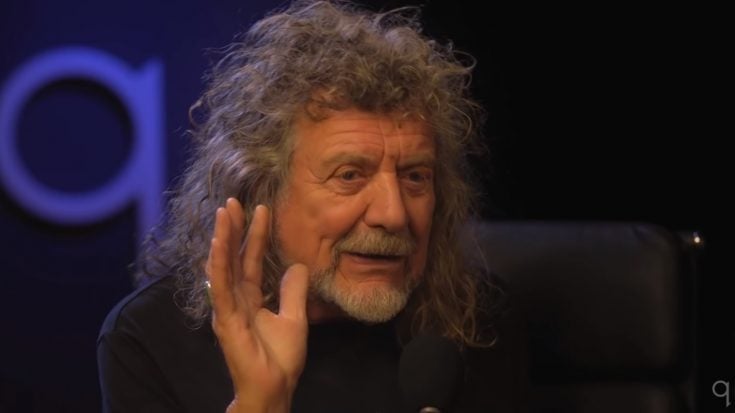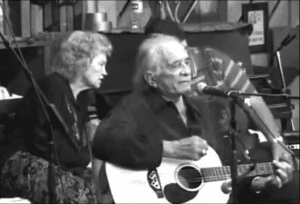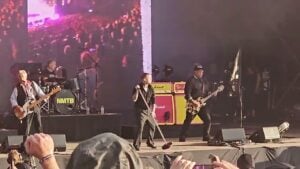Robert Plant Explains Their Rivalry With The Rolling Stones

Robert Plant in an interview - q on cbc / YouTube
Led Zeppelin and The Rolling Stones are two of the most significant acts in rock history. One might expect a profound sense of mutual respect or perhaps even a modicum of admiration between them.
However, it appears that the only member of Led Zeppelin to earn respect from guitarist Keith Richards is Jimmy Page, while the rest of the band left him thoroughly unimpressed.
Though Stones frontman Mick Jagger had different views, the legendary guitarist had not changed his views on the other band, which he thought “never took off musically”.
In a 1988 interview with Details, Led Zeppelin’s frontman Robert Plant, who was a legend of his own, seemed to recognize the rivalry. “The Stones always came out on top. I guess there was some rivalry there,” Plant admitted.
But rock and roll is too big a stage even for titans like them. This thinly-existing rivalry isn’t really a big deal for these bands, who have brushed elbows many times during the height of rock and roll. Except for one nasty fellow named Keith Richards.
As the two bands rocked in different musical directions – though both lived an albeit similar trajectory of rock and roll excess – no one can deny that the path they carved in the map of rock music led to monuments that endure to this day.
“We were doing the business, and they weren’t.”
Both rock icons have warm seats in the withered pantheon that is The Biggest Band in the World. The only difference that even Plant lamented during their time was that Led Zeppelin wasn’t a media darling.
View this post on Instagram
“It’s funny, we always used to moan because the Stones got all the publicity,” Plant recalled in the Details interview. “But the Stones have always had that. At the time, we used to sit back and go, ‘It’s terrible really, but then again, is it important, really? Do we have to say how many records we broke? Is it important that the Daily Express and The Times and The Guardian all know this? Or would it be better if they didn’t know anything at all?’”
And probably this is what separates them from the Stones. Led Zeppelin has always been chasing the peak in their creation, always in the mood to push the boundaries of what can Led Zeppelin do.
Most of the time, they succeeded in creating iconic records, but some of these were ahead of their time. The holier-than-thou critics did not know nor understand what they were hearing.
Their self-titled debut was dismissed even by Rolling Stone, and it gave birth to hard rock and reshaped the genre. And this dilemma with the media has always bit the band’s behind. But they only shrugged it off, moved on, and continued working.
View this post on Instagram
After three genre-quaking powerful albums, Page has had enough and decided to release an album with no title. Led Zeppelin IV, as fans call it, was a gamble – a defiant stand against critics who routinely diminish the band’s achievements.
Against the advice of their agent who thought the scheme was “professional suicide”, Led Zeppelin released the album. “We just happened to have a lot of faith in what we were doing,” Page affirmed.
And what they were doing and had done was phenomenal, Led Zeppelin IV included. The album would become one of the bestselling rock albums of all time, so influential that Royal Mail would commemorate it with a UK postage stamp in 2010.
Royal Mail album artwork stamps from 2010 pic.twitter.com/NzJKCVARfM
— Bands FC (@_Bands_FC) January 27, 2019
The band’s iconic middle finger in the form of a hard-stomping record was a resounding success that critics had no choice but to swallow and praise.
Interestingly, the Stones did not have an album as commercially successful as Led Zeppelin IV. Not one even came close. Led Zeppelin was indeed doing the business. That’s all that matters to these guys. As Plant articulately concluded:
“Because we always knew we were doing the business and they weren’t. We only thought it mattered half the time- when they were near us. Or when one of our roadies wanted to go to them because they had more cocaine than we had. Like a takeover bid. You know, it didn’t affect how you played. It didn’t affect the reaction on any given night. It’s just that the confrontations were always a bit twitchy. But everybody pretended it was okay. Something like young boys pretending they’re studs. Ten Paul Newmans in one room. It didn’t really matter, but it was good to wind up the situation for a bit of sport.”
Led Zeppelin was “a little hollow”
Plant could have all the business he wanted, but Keith Richards cared little about it. He just never liked Led Zeppelin, except for Page whom he thought was “one of the best guitar players”.
“To me, Led Zeppelin is Jimmy Page if you wanna cut the story short.”
View this post on Instagram
Richards thought Bonham was “a hell of a powerhouse drummer” but the late Bonzo was too heavy-handed for his taste. As for Plant?
“The guy’s voice started to get on my nerves. I don’t know why; maybe he’s a little too acrobatic,” the guitarist said with palpable disdain.
Answering fan questions on his website in 2004, Richards did not think fondly of the exuberant frontman of Led Zeppelin.
“Robert is exuberant to be an LV (lead vocalist) but he’s very much in that English mode of LVs like Roger Daltrey, with the fringes, microphones blah blah like you’re Rod Stewart’s or even Mick Jagger’s — they all seem to copy each other a bit.”
This venom remained bitter even in 2015. In an interview with Rolling Stone, while Richards continued to sing praises for Jimmy, his contempt for Led Zep remained biting. “Jimmy is a brilliant player. But I always felt there was something a little hollow about it, you know?” the guitarist said.
Keith on stage in Auckland pic.twitter.com/ciDZRQMTpq
— Keith Richards (@officialKeef) November 23, 2014
Richards, in the same interview, admitted that he wasn’t a fan of many of his peers. Heck, earlier in that same year, he even dismissed the Fab Four’s Sgt. Pepper’s Lonely Hearts Club Band as “rubbish”. Pooh!
But Keith Richards is Keith Richards. His place in rock and roll is undeniable and he can say anything he wants. In this sense, even Led Zep’s Jimmy Page can agree, though he wasn’t sure what his friend meant by calling his mythical band ‘hollow’.
“Keith can say what he wants. He’s Keith Richards. I think he’s done some amazing work. I respect his playing,” Page told Ultimate Classic Rock. “And he has a solo album out. But if I was promoting a new album, would I be more caustic? The answer is… no. I’m not sure what he means by calling Led Zeppelin hollow. I think he’s got his tongue in his cheek. What we did was really cool,” Page said.
Jimmy Page the occasional Stone
Page has always been welcome to Richards’ territory, even before Led Zeppelin ascended the heights of rock and roll superstardom. But the band, Richards did not want to share a stage with them. Curiously, this feeling was only felt by the guitarist.
During Led Zep’s early days, Jagger saw them and thought they were “brilliant”. “I remember watching their concerts live in New York and everything. And it was great, thunderous, wonderful racket. Brilliant.”
Ronnie Wood, who was friends with a lot of the greats in the 70s rock scene, jammed with Led Zeppelin for an encore during one of their gigs in 1975 (Wood was not yet a Stone, though he was almost there as he had started contributing to their songs.)
Ian Stewart, the beloved Sixth Stone and the band’s stalwart shadow and resident boogie woogie enthusiast, had lent his services to Led Zep songs “Rock And Roll” & “Boogie With Stu”.
In turn, John Paul Jones helped the Stones arrange the strings for “She’s a Rainbow”.
The interactions here and there are frequent and significant. But it was Jimmy Page who had left deeper marks in the relationship.
Back in the day, a young Page cut his teeth around the session circuit of London. He was so good and so in demand that he was basically omnipresent in tons of recordings in the 60s. If you needed a reliable sessionist, Page was the man.
His guitar work is present in Donovan’s “Sunshine Superman”, in some of the songs by The Who and The Kinks, and in Joe Cocker’s “With a Little Help From My Friends”. He even played some rhythm for the orchestral instrumental versions of some of the songs from A Hard Day’s Night’s American release.
In 1964, Page did some demo work for the Rolling Stones. Specifically, in an early version of “Heart of Stone”. The track was not released until it became a part of the 1975 release Metamorphosis.
Another Stones work by Page was uncovered more recently. In October 1974, around the time when Led Zeppelin was working on Physical Graffiti, a mythical session took form somewhere in London. Page’s band has left but for some reason, he decided to stay.
“My recollection is we walked in at the end of a Zeppelin session. They were just leaving, and we were booked in next and I believe that Jimmy decided to stay,” Richards recalled. “We weren’t actually cutting it as a track, it was basically for a demo, a demonstration, you know, just to get the feel of it, but it came out well, with a line up like that, you know, we better use it.”
Jagger and Richards, along with Page and Blind Faith bass player Rick Grech, recorded a song that never saw the light of the day until 2020. The song, which was titled “Scarlet”, was only released in the latest reissue of Rolling Stones’ UK No. 1 hit Goats Head Soup.
Jagger remembered, “I remember first jamming [Scarlet] with Jimmy and Keith in Ronnie’s basement studio. It was a great session.”
After the disbandment of Led Zeppelin, Page recorded yet another track with the Stones, one that cracked the Top 40. The song, “One Hit (to the Body)”, was released in 1986 as the opening track of Dirty Work.
And, of course, it featured a memorable Page solo, which you can hear below:















